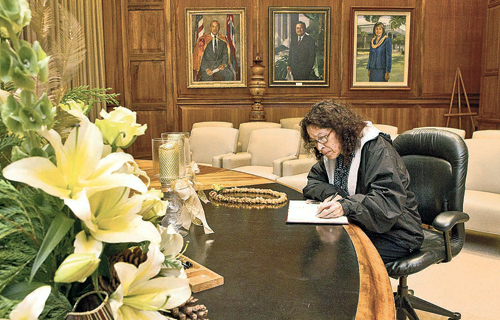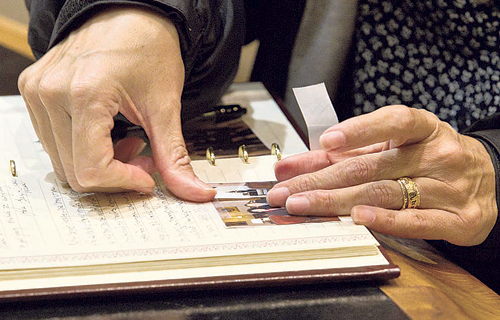Whenever U.S. Sen. Daniel Inouye was in Honolulu, he would ask his war buddy Glenn Nakasone to invite friends from Company E of the 442nd Regimental Combat Team for a gathering.
"I was very close to him," said Nakasone, an Aiea resident.
Nakasone and other World War II veterans of the 442nd, who fought to break the barriers of discrimination against Japanese-Americans and prove their loyalty to the United States, will pay their respects to their friend and his family at the National Memorial Cemetery of the Pacific at Punchbowl on Sunday.
Nakasone, 91, said "Danny" and he had a special bond.
Both were descended from families who came to Hawaii to work as contract laborers in the sugar cane fields.
|
"The lieutenant … would pronounce Inouye’s name ‘I know you.’ He (Inouye) would say, ‘Yes, present.’ … We used to laugh."
–Glenn Nakasone, served with Inouye in the 442nd Infantry during World War II
|
Both were promoted to staff sergeant in Company E at the same time during World War II, and both became amputees as a result of the war — Inouye lost his right arm, and Nakasone lost his left leg and a toe.
"Every time we get together he asks, ‘How you getting along with your leg?’" Nakasone said.
Each required a couple of years of rehabilitation at military hospitals before they were discharged.
Their war injuries changed their plans for the future.
Nakasone had wanted to go into business but decided to get a federal job at Hickam Air Force Base as an accountant. Inouye, who had planned to be a surgeon, went to law school and entered politics.
Retired University of Hawaii academic adviser Rachel Omori, who is distantly related to Inouye, remembered her husband Morio sharing an office space with Inouye as attorneys when Inouye had his own law practice.
Omori remembered organizing a group of volunteer secretaries at night to type letters of support on behalf of Inouye when he made his first run for Congress in 1959.
"I always liked what he stood for. He always stood up for the small guy," she said.
Omori said when the veterans of the 442nd came home, they realized if they stood together they could make social and economic changes.
Omori said the senator understood the racial prejudice faced by Hawaii’s Americans of Japanese ancestry during World War II and how they suffered terrible injustices.
Omori said half of her family in California, including her sister, was interned in camps, while her brother joined the 442nd Regimental Combat Team and received a Silver Star for gallantry fighting for the United States in World War II.
"You see the irony?" she said.
Former Maui Mayor Elmer Cravalho said Inouye was recognized as a leader among the Democrats early in his political career, rising to Territorial House majority leader after being elected to his first term in 1954.
Cravalho said the economic success enjoyed by working people in Hawaii was in no small part due to political changes that came about due to a groundswell of support for Americans of Japanese ancestry who returned from World War II.
The Democrats loosened the control held by several large sugar plantation corporations and forced the sale of land in Hawaii for new housing subdivisions and industrial areas, Cravalho recalled.
Inouye was also a part of the group that helped to found Central Pacific Bank, providing business loans to minorities.
Nakasone said "Danny" was younger than him by three years when they entered the military, but Inouye showed leadership skills early and was promoted to corporal before they went overseas.
Like many Japanese-Americans from Hawaii in the 1940s, Inouye spoke pidgin English but wrote in perfect English.
Nakasone, who met Inouye’s parents at a coming-home party at the family’s house in McCully after the war, said Inouye would entertain by playing the piano with one hand.
"He was good at it," Nakasone said. "He played popular Hawaii music."
Nakasone lost his left leg and a toe on his right foot when he stepped on a mine in September 1944, after the 442nd soldiers crossed the Arno River in Italy to begin a major assault on the German’s Gothic Line.
Seven months later Inouye, then a commissioned lieutenant, lost his right arm in a charge of a series of German machine-gun nests at San Terenzo, Italy.
Nakasone said that during basic training the officers had never met a Japanese person and pronounced Japanese names "all kinds of ways."
Inouye’s name was no exception and Inouye went with the flow.
"The lieutenant … would pronounce Inouye’s name ‘I know you,’" Nakasone recalled.
"He (Inouye) would say, ‘Yes, present.’ … We used to laugh."
Near sunrise Sunday, Nakasone and other 442nd veterans who knew Inouye will be saying goodbye to the man who valued their friendship and shared their endearing appreciation of loyalty throughout his life.




